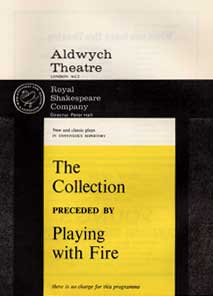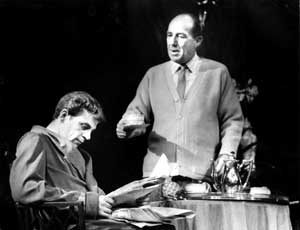

|
| The Collection - Premiere | ||
First presented by theRoyal Shakespeare Company, Aldwych Theatre, London, 18th June 1962 Harry - Michael Hordern Directors - Peter Hall and Harold Pinter Setting - Paul Anstee and John Bury It might be a farce, but needless to say as Mr. Pinter goes about things it ends up as nothing of the sort; it becomes instead a cool, precise exposition of the thesis, recurrent in his drama, that full communication is impossible between human beings not so much because they cannot communicate ñ though that is sometimes true as well ñ as because they withdraw from communication; they deliberately and inescapably shield themselves from being wholly known ñ and therefore in the power of the knower ñ by retreating into equivocation, half-truth, untruth or in the last resort just plain silence. These particular characters are, as a matter of fact, perfectly articulate: far more than in any other of Mr. Pinterís plays. But if anything this only separates them more, since their powers of self-defence are consequently all the greater.
This is perhaps to treat over-ponderously a play
which is slight, economical and, after all, often funny. As it happens
there is perhaps the slightest suspicion that the author and his
co-director, Mr. Peter Hall, have made precisely the same mistake,
if mistake it be. One sees what they mean, of course: if it were
more lightly and swiftly handled, it might too easily pass for a
purely formal, artificial comedy and nothing else. Possibly, however,
it could still be played a little more quickly, a line here and
there could be thrown away, without the serious point being lost
ñ one wonders if an author is always in this respect his own best
directorial advocate. There can be no doubt at all, though, about
the excellence of the performances Mr. Pinter and Mr. Hall have
extracted from their distinguished cast; Mr. John Ronane in particular
is quite devastatingly acute as the petulant slum-bred designer
with just a thin veneer of upper-class English and plausible social
graces, liable to crack in an instant if any pressure is exerted
on it. Playing with Fire, fluently translated by
Mr. Michael Meyer and briskly directed by Mr. John Blatchley, is
in contrast little more than a squib. It is easy to take it for
more with hindsight derived from Strindbergís later works (it dates
from 1892), but basically it seems to be merely an amiable deflation
of various dramatic clichés current in its day, with a few
unusually acute pieces of pre-Freudian psychology (particularly
on the emotional stimulus provided by a third party to any love
partnership) to help it along. Excellent performances from Mr. Colin
Jeavons as the weak but cunning artist hero and Mr. Kenneth Haig
as the stiff-necked would-be lover; stunning set by Mr. John Bury. |
||
| Back to plays Main Page |

